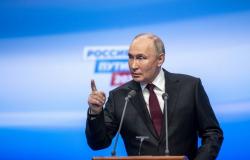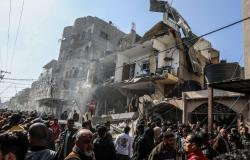
How close were Russia and Ukraine to a peace deal? The publication “Foreign Affairs” analyzed the texts of the proposed agreements and the possible reasons why the two belligerents finally backed down.
Peace negotiations between Ukraine and Russia in Turkey in March 2022 PHOTO PROFIMEDIA
A lesser-understood aspect of the war is that Russia and Ukraine have engaged in intense diplomacy, drafting a framework for negotiations just a month after the war broke out and making substantial progress toward a final agreement. In May, however, the parties suspended the talks.
Interviews with participants, official statements, and a chronology of the negotiations allow the pieces to come together and shed light on implications for future diplomacy, while revealing previously unknown details.
An agreement was on the table, but the Ukrainians were persuaded by the West to abandon it, Vladimir Putin complains, while other observers downplayed the seriousness of the negotiations from the outset.
These theories contain a grain of truth, but they ignore a fact that, in retrospect, seems quite extraordinary: in the midst of Russia’s unprecedented aggression, the parties were on the verge of finalizing an agreement that would end the war and provide Ukraine with multilateral security guarantees thus preparing the ground for permanent neutrality and EU membership.
But it was not possible for several reasons, including: Western partners were reluctant to enter into negotiations with Russia that would have included commitments to provide security to Ukraine, Russia’s failures on the battlefield that encouraged Kiev that it can win on the field of fighting, the premature ambition to reach a long-term settlement and resolve entrenched security disputes while a simple ceasefire seemed unattainable.
On March 10, Ukrainian Foreign Minister Dmytro Kuleba, in Turkey for a meeting with his Russian counterpart Sergei Lavrov, spoke of a “systematic and lasting solution” for Ukraine, adding that Ukrainians were “ready to discuss” the guarantees that he hopes to receive them from NATO member states and Russia.
Unlike NATO, which stipulates the collective defense of an attacked state, multilateral security guarantees are intended to prevent a conflict between guarantor countries.
Russia”he hoped until the last moment that [ar putea] to press us to sign such an agreement, that [vom] adopt neutrality. This was the most important thing for them. They were ready to end the war if […] we would have pledged not to join NATO”declared David Arahamia, the head of the Ukrainian delegation, last year.

Peace negotiations between Ukraine and Russia in Turkey in March 2022 PHOTO PROFIMEDIA
First progress
The negotiations made the first substantial progress with the Istanbul joint communique of 29 March.
The guarantor states were obliged to: impose a no-fly zone, supply weapons or direct military intervention.
It was when Russia announced its withdrawal from the northern front to “build mutual trust”. This cleared the way for the arrival of Western military aid and allowed the discovery of atrocities in Bucea and Irpin, on the outskirts of Kiev. At the same time, he gave confidence to Zelensky that Russia’s military machine is not unstoppable.
However, the parties continued to work under fire on the text of a peace treaty for the leaders to sign at an upcoming summit.
Vladimir Medinski, the head of the Russian delegation, said optimistically that Ukraine had shown in writing that it was willing to meet important conditions for Russia, outlining the “principles for a potential agreement”.
According to those involved, in the latest version, from April 15, the Russians made important changes to an article on assistance in case of attack, namely that this was possible only with the agreement of all guarantors, and not decided independently, as in the previous text.
And on other issues there were important disagreements, such as the size of the Ukrainian army or the maximum range of weapons, and yet, Oleksandr Ciali said, “we came very close, in mid-April 2022, to ending the war with a peace agreement.”
What happened?
In Putin’s view, the Western powers intervened and, through then-British Prime Minister Boris Johnson, sent the message that they must “fight Russia until victory and until Russia suffers a strategic defeat”.
During his first visit to Kiev on April 9, Johnson reportedly told Zelenski that any deal with Russia would be “dirty,” while the head of the Kiev delegation said he advised him not to sign and fight .
In parallel, US Secretary of State Anthony Blinken spoke of the fruitful strategy of massively supporting Ukraine and putting maximum pressure on Russia.
“The strategy we put in place – massive support for Ukraine, massive pressure against Russia, solidarity, with more than 30 countries engaged in these efforts – has real results,” Blinken said two weeks away from Johnson, from Kiev.
The confidence of the Ukrainians that they can win certainly played its part. For example, Kiev demanded the withdrawal of Russian troops from Donbass as an essential precondition.
“A treaty with Russia is impossible – only capitulation can be accepted”, Oleksii Danilov, then head of the Ukrainian National Security and Defense Council, concluded on May 2.
One reason for the failure of the talks was the particularly ambitious goal: a peace treaty to resolve old disputes instead of an armistice and the settlement of important disagreements and immediate issues, such as the territories occupied in the invasion.
Tags: peace negotiations Russia Ukraine failed Unpublished details diplomacy months war
-




